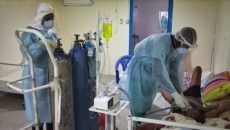MONROVIA, Montserrado – Commerce Minister Wilson Tarpeh, who chairs the National Steering Committee for the COVID-19 food distribution, says senators are responsible for the high administrative cost requested by the U.N. World Food Programme to head the food distribution.
Appearing before the Senate on June 12, Tarpeh told senators that WFP had charged the government US$9 million, amounting to 30 percent of the total package of US$30 million, as the administrative cost to carry out the nationwide distribution.
The pronouncement angered some senators, including Sen. Darius Dillon of Montserrado, who thought that the amount being charged for the distribution was too much and unreasonable.
Sen. Dillon questioned why the National Food Assistance Unit did not spearhead the food distributions, one of its key legal responsibilities.
Sen. Nyonblee Karnga-Lawrence of Grand Bassa also said she believed that the WFP’s administrative cost should not exceed more than 10 percent of the US$30 million being used on the relief initiative, adding that the agreement between the government and the international relief organization must be revisited.
“And we need to be critical about it because we can’t have almost 50 percent of the funds be used for administrative and operational costs,” Sen, Karnga-Lawrence said.
Margibi’s Senator, Oscar Cooper also termed the WFP’s operational cost as “extremely wasteful.”
“Since COVID-19 and the way things are, the word ‘vulnerable’ has extended to even people who lost their jobs and cannot afford to buy food to eat. We need to re-look at the plan and reduce [it] so the vulnerable can receive it. This is of serious concern,” Sen. Cooper said.
But the minister reminded the senators that they passed the resolution for the state of emergency relief plan and that they should be blamed for any dissatisfaction that emerges over the outcome of the resolution, including the selection of WFP to spearhead the food distribution, over the National Food Assistance Unit.
“You have set the criteria by the resolution you chose, which is the guideline for the drill that we are going by,” he said.
According to him, using the National Food Assistance Unit would have been better, since it was a cardinal reason for which the institution was established. However, he noted that the lack of budgetary appropriation to the unit by the legislature makes it incapable of implementing the food support.
“Hopefully in the next budget, this honorable body will give it resources to work. It is an institution to build because it is designed to do what WFP is doing,” he added.
“Notwithstanding that, after [the] executive order was passed, has included the NFAU to head the monitoring of this food program,” Tarpeh added.
He also defended that while his committee was given the responsibility to put together the Food distribution plan, the Ministry of Finance was the authority designated to sign the food distribution contract with the WFP, which was attested by the minister of justice.
“I requested a copy of the agreement but I have not received a copy and I am told the Ministry of Finance is trying to get it to me. Please give me a couple of days and I will bring it in front of this honorable body,” he also added.
He also notes that the food distribution will be implemented as sanctioned by the legislature.
“You have made the groundwork. The president sent you a document that said four counties should receive food baskets – Grand Kru, Margibi, Montserrado, and Nimba. The House has defined that the people and the vulnerability be served and we are going to stick by that,” he affirmed.
“Also based on the Senate’s approval of the budget, food distribution will only be done one time. If you feel that one time is inadequate, that remains in your domain. As far as the steering committee is aware, the government decided to outreach all the counties using US$25 million from the recast budget,” he added.
According to him, WFP did its first test run of food distribution serving 20 localities, including orphanages, the school of the blind, the disabled, and other vulnerable groups.
He noted, “75 households and 371 people were served. We did the test run followed by a closed margin to see what it was we did right, what we can do better, and what we did poorly. With it, we realized that the planning should be improved in terms of communication to the public and communication to the beneficiaries.” He said another test was done on June 13.
However, WFP has recently disputed a claim of US$9 Million in administrative fees for COVID-19 food support.
The global aid organization clarified that close to six percent of the US$30 million budget would be directed to meeting its minimum costs to deliver its ‘lifesaving assistance,’ in line with international standards across all countries it is working in to deliver aid packages.
It said the amount constitutes the administrative costs, including allocations toward the support costs of its Liberia country office. Those costs, it said, are directly linked to the execution of the program, such as applicable rental costs, back-office staff costs, and allocations toward the support costs of its Regional Bureau in their oversight and support function, also known as Indirect Support Costs.
Featured photo by Zeze Ballah



